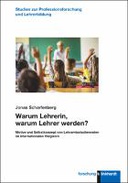Explore

Warum Lehrerin, warum Lehrer werden?
Jonas Scharfenberg
2020
0 Ungluers have
Faved this Work
Login to Fave
This study examines (1.) which career choice motives influence the career choice of future teachers and whether the career choice motives of future teachers from Germany, Sweden, Romania and the U.S. differ from each other, (2.) whether these motives are connected to other personal attributes of future teachers (e.g. self-efficacy) and (3.) whether varying systemic influences (e.g. policy decisions) can help explain why career choice motives vary between different countries.
The study uses a mixed-methods design. First, a confirmatory factor analysis with measurement
invariance analysis confirms a model consisting of 16 career choice motives that can be measured across the four countries. The model includes nine intrinsic, four extrinsic and three pragmatic motives. Career choice motives differ significantly across countries: American participants achieve the highest intrinsic, German participants the highest extrinsic and Romanian participants the highest pragmatic values. Swedish participants show a heterogeneous profile.
Second, a cluster analysis shows three distinct career profiles of future teachers that can be observed in all participating countries. A comparison between the career choice motives and other personal attributes like self-efficacy shows that a purely intrinsic motive profile is more functional than a motive profile that includes extrinsic or pragmatic elements as well. However, effect sizes stay small. A cluster consisting of purely extrinsically motivated future teachers could not be found – extrinsic and intrinsic motives seem to complement each other rather than to be in competition.Third, it is possible to identify relevant aspects of the professional environment that are connected to the career choice motives of future teachers. Participants describe, for example, how the likelihood of peers or parents recommending the profession varies depending on the salary, the overall attractiveness and the reputation of the career. Furthermore, working conditions and the bureaucratic workload of teachers influences subject-related intrinsic motivations. Higher level factors of influence include politics & policy, university, societal factors and other stakeholders. Modifying the professional environment of future teachers, those factors can have an influence on their career choice motives as well. Educational reforms, for example, can shape the range of professional tasks that teachers are required to do, while changes in the structure of the professional training programs can shape how easy it is to become a teacher.
Using these results, it is possible to find concurrences between the differences in the professional environment and the career choice motives of future teachers from different countries. The results show how societal factors, politics, but also universities and in the end teacher training programs themselves can have an influence on who wants to become a teacher – and why: Especially the influence of teacher training programs highlights the need for further professionalization of the field.
This book is included in DOAB.
Why read this book? Have your say.
You must be logged in to comment.
Rights Information
Are you the author or publisher of this work? If so, you can claim it as yours by registering as an Unglue.it rights holder.Downloads
This work has been downloaded 138 times via unglue.it ebook links.
- 138 - pdf (CC BY-NC-SA) at OAPEN Library.
Keywords
- Apprenticeship trade
- Arbeitsumgebung
- Äußere Motivation
- Berufsbelastung
- Berufsbild
- Berufswahl
- Career Choice
- Career profile
- Choice of studies
- Cross-national comparison
- Deutschland
- Education
- Einflussfaktor
- Fragebogenerhebung
- Germany
- Higher & further education, tertiary education
- Innere Motivation
- International Comparison
- Internationaler Vergleich
- Interview
- Lehramtsstudent
- Lehrberuf
- Lehrer
- Lehrerausbildung
- Motivation
- Occupational choice
- Occupational image
- Occupational profile
- Perception
- Pragmatism
- Pragmatismus
- Qualitative Forschung
- Qualitative research
- Quantitative Forschung
- Quantitative research
- questionnaire survey
- Romania
- Rumänien
- Schweden
- Selbstkonzept
- Self Concept
- Society & Social Sciences
- student teachers
- studie
- Studienwahl
- Sweden
- Teacher
- Teacher Education
- Teacher Training
- Teaching profession
- thema EDItEUR::J Society and Social Sciences::JN Education
- thema EDItEUR::J Society and Social Sciences::JN Education::JNM Higher education, tertiary education::JNMT Teacher training
- USA
- Wahrnehmung
Links
DOI: 10.35468/5759Editions

